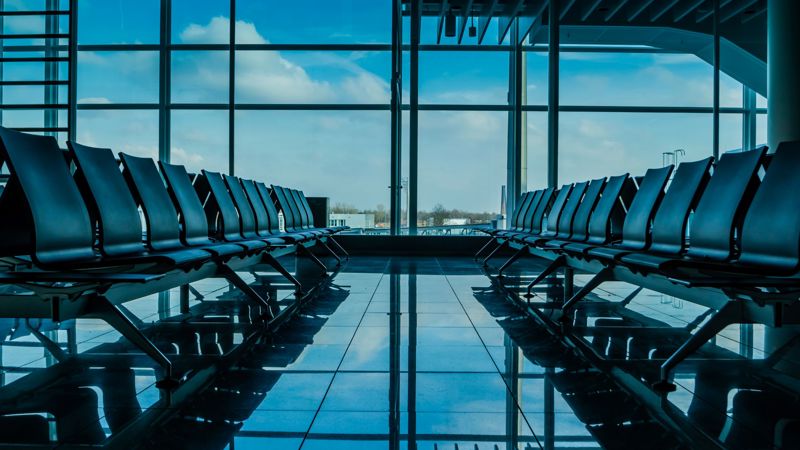
The skies above Europe are noticeably empty. With governments restricting international travel and passengers keen to avoid confined spaces, much of the continent’s airline fleet is grounded.
Some commentators have looked at the avoided emissions caused by this hiatus in air travel as a silver lining to the social and economic devastation wrought by the coronavirus. IATA, an airline trade body, suggests that demand for air travel in Europe is down by as much as 90% compared to the same period last year. Air transport accounts for more than two percent of global carbon dioxide emissions, meaning that the pandemic could reduce global air transport emissions by hundreds of millions of tonnes. Even if social distancing and lockdown measures are relaxed, international travel will likely remain restricted for much of the year. As Alexandre de Juniac of IATA noted: “we are not expecting to re-start the same industry that we closed a few weeks ago”.
But the idea that this hiatus is anything other than a short-term boon for the planet is misguided. Aviation will bounce back, and when it does we will face many of the same challenges in decarbonising a fast-growing sector. Growth will continue, spurred on by booming demand in emerging economies—passenger journeys are expected to more than double in China and Indonesia and to quadruple in India by mid-century. Even accounting for a temporary fall in emissions, aviation is on track to use up more than a tenth of the remaining 2050 carbon budget implied by the Paris Agreement.
What is more, the coronavirus induced collapse could have three lasting effects on the sector’s environmental ambitions.
First, while governments around the world are extending loans and grants to help cash-strapped airlines, some will fold or be swallowed up by rivals. This may slow rather than speed the reduction in emissions. Competition between airlines is a key driver of efficiency and innovation as carriers face pressure from their bankers to trim their fuel bills and from passengers to offer greener flights. If the legacy of the crisis is industry consolidation, the surviving airlines may feel these pressures less acutely. Airlines may also be able to get away with postponing fleet renewals or deprioritising R&D. Of course, if consolidation drives up fares this may have an environmental upside. Higher prices might encourage some travellers to look closer to home for their summer holidays. But these effects are likely to be small. Estimates from the UK Department for Transport suggest that even if tickets prices increased by one quarter, air travel would be unlikely to fall by more than 15%. A less competitive industry is unlikely to be good news for the planet.
Second, even if the players remain unchanged, the rules of the game may be fundamentally altered. Take CORSIA, international aviation’s flagship emissions trading scheme, which was due to come into effect in 2021. The scheme requires airlines to ensure any growth above 2019/2020 levels was carbon neutral, achieved by a combination of in-sector abatement and the purchase of carbon offsets. But even the 2020 ambition now looks vulnerable. IATA has already said that CORSIA ‘must be adjusted to ensure the sustainable development of international aviation and avoid an inappropriate economic burden on the sector’. Calls for the scheme to be tweaked are likely to grow louder, creating more tension between countries and carriers. The same logic holds for the patchwork of other environmental targets, taxes and trading schemes—from fuel blending mandates in the Netherlands to the ‘eco-tax’ in France.
Lastly, there is the question of how governments choose to stimulate their wider economies. The reflex response so far has been to extend unconditional support to existing industries, including fossil fuels. In China, for instance, the National Energy Administration in China recently announced it was ready to relax rules on coal power investment to kick start the economy. In the United States, the stimulus bill put forward by the Trump administration included an oil spending spree for Strategic Petroleum Reserve, although this was later walked-back. How we stimulate the economy matters, argues Fatih Birol of the International Energy Agency: ‘if we go for the wrong investments in the energy sector, that could lock in our energy system for years to come’. This is also true for aviation, where any pathway to zero-emissions air transport will necessarily involve fossil free energy sources—batteries or hydrogen for short-haul flights, sustainable biofuels or synthetic fuels for long-haul. Quick and dirty stimulus packages that push down the cost of fossil fuels will only delay this transition.
There are reasons to be optimistic about the transition to a zero-carbon air transport sector. Many of the technologies needed to improve energy efficiency and carbon intensity are already available, and policy makers have a wider range of tools at their disposal to accelerate research, development and deployment. But in these uncertain times, governments will need to think carefully about the lasting impacts of today’s decisions.
For more information, please contact Chris Cuttle.



